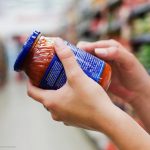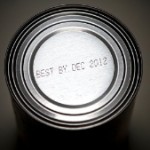The Michigan Department of Agriculture and Rural Development (MDARD) is warning consumers to not eat any Kuntry Gardens produce or products made with produce from Kuntry Gardens of Homer, Michigan. The products may be contaminated with raw, untreated human waste. During a routine produce safety inspection, MDARD staff identified that the company was using raw, untreated human waste on the fields where produce was grown. The produce is sold in local grocery stores and also through direct sale from the farm. The use of raw, untreated human waste for growing commodities intended for human food is a violation of the Michigan Food Law, as well as other state and federal laws and regulations. Human feces and urine can be contaminated with many pathogens, including rotavirus and … [Read more...]
Stay Safe While Cutting Food Waste At Home and Away
While food safety is of ultimate importance, everyone should also keep minimizing food waste in mind. And there are ways to do just that with tips from the FDA. Read on to learn how cutting food waste at home is a good idea monetarily and for the planet. While 48,000,000 Americans suffer from food poisoning every year, Americans also discard almost 40,000,000 tons of food annually. That averages out fo 219 pounds of waste per person, or about 35% of our food supply. And that food decomposes and creates methane, a big component in climate change. While much food is rightfully discarded because it could cause illness, a lot, about half of the total discarded, is thrown away because consumers don't understand food product dating. And food waste occurs at every step in the food … [Read more...]
Learn About the FoodKeeper App
The USDA has developed an app for your phone to help you keep your food fresh. It's called the FoodKeeper app. It provides advice on how to store foods and beverages and minimize food waste. It's available for Android and Apple devices. In 2016, the government updated the app to include more than 400 food and beverages items available in an online data feed. Every time you open the app, it will check the data feed for updates. If you don't have an Android or Apple dev ice, you can find this information at FSIS.gov and at Data.gov. The data feed is downloadable. The feed has specific storage and cooking guidelines and information on items such as baby food, dairy products, egg, meats, poultry, produce, and seafood. Storage timelines for the refrigerator, freezer, and pantry are … [Read more...]
USDA Issues Revised Guidance on Food Date Labeling
Most consumers are pretty confused when it comes to the meaning of date labels on foods. For instance, what does "use by" mean? Does that mean the food is unsafe after that date? What does "sell by" mean? So the USDA's Food Safety and Inspection Service (FSIS) has issued updated information on food product labeling. They are encouraging food manufacturers and retailers to use a "Best If Used By" date to help reduce food waste. Al Almanza, USDA Deputy Under Secretary for Food Safety said, "In an effort to reduce food loss and waste, these changes will give consumers clear and consistent information when it comes to date labeling on the food they buy. This new guidance can help consumers save money and curb the amount of wholesome food going in the trash." Product dating is not … [Read more...]
Cut Food Waste But Maintain Food Safety
September is National Food Safety Education Month, and the government is trying to tell consumers that is is possible to reduce food waste while still eating safe food. Every year, there are about 48,000,000 cases of food poisoning in the United States. That leads to 128,000 hospitalizations and 3,000 deaths. But food waste is also a major concern. Every year, 80% of our freshwater, 10% of the available energy, and half of our land is used to get food to our tables. And organic waste, mostly food, is the second biggest component of landfills. Landfills are the third largest source of methane emissions, which contribute to climate change. Since 30 to 40% of food in the U.S. is thrown out, we are contributing to climate change and wasting a lot of money. Americans discard about … [Read more...]
Do You Know How to Keep Food Fresh and Safe?
An organization has developed an Infographic to help consumers keep their food fresh and safe. More than 40% of all food in the U.S. is thrown out every year. This type of waste is costly and hard on the environment. It's estimated that food that is discarded costs $165 billion every year. And uneaten food is the single largest component of municipal waste in the U.S. This rotting food emits methane, a greenhouse gas. And since 1 in 6 Americans is "food insecure", meaning they don't know where their next meal is coming from, food waste is hurting people. The Infographic tells you the best place to store food in your refrigerator. For instance, did you know that the door isn't a good place to store anything perishable, since it's the warmest part of the appliance? Do you know how to … [Read more...]
What You Need to Know About Use-By Dates
Everyone knows about those use-by or "best by" dates on packaged products. They are used to recall items and are supposed to help consumers make good decisions about the foods they eat. But did you know there is no national standard for these dates, and the expiration dates only apply to food quality, not food safety? The FDA leaves the decision for the date up to the manufacturer. The USDA, which monitors meat, poultry, and egg products, also says that the dates are set by the manufacturer. While some states require date labels, others have no such requirements. The National Resources Defense Council has written a paper about this issue. They say that since consumers usually discard food past its use by date, they are wasting billions of pounds of food every year, needlessly. [Editor's … [Read more...]
New Study Finds Half of Global Food Goes to Waste
The Institution of Mechanical Engineers (IMECHE) has released a new study that concluded half of all global food goes to waste. One to two billion tons of all food produced on this planet is lost before reaching a human stomach, according to Dr. Tim Fox, Head of Energy and Environment for IMECHE. Current estimates are that we are going to have 9.5 billion people on this planet by 2075; that could grow to more than 12 billion by 2100. And there will not be enough food to feed them if this waste continues. Factors accounting for this waste include poor practices in harvesting, storage, and transportation, market waste and consumer waste. In third world and developing countries, the waste occurs mostly at the farmer-producer end of the supply chain. Inefficiencies in harvesting, poor … [Read more...]











